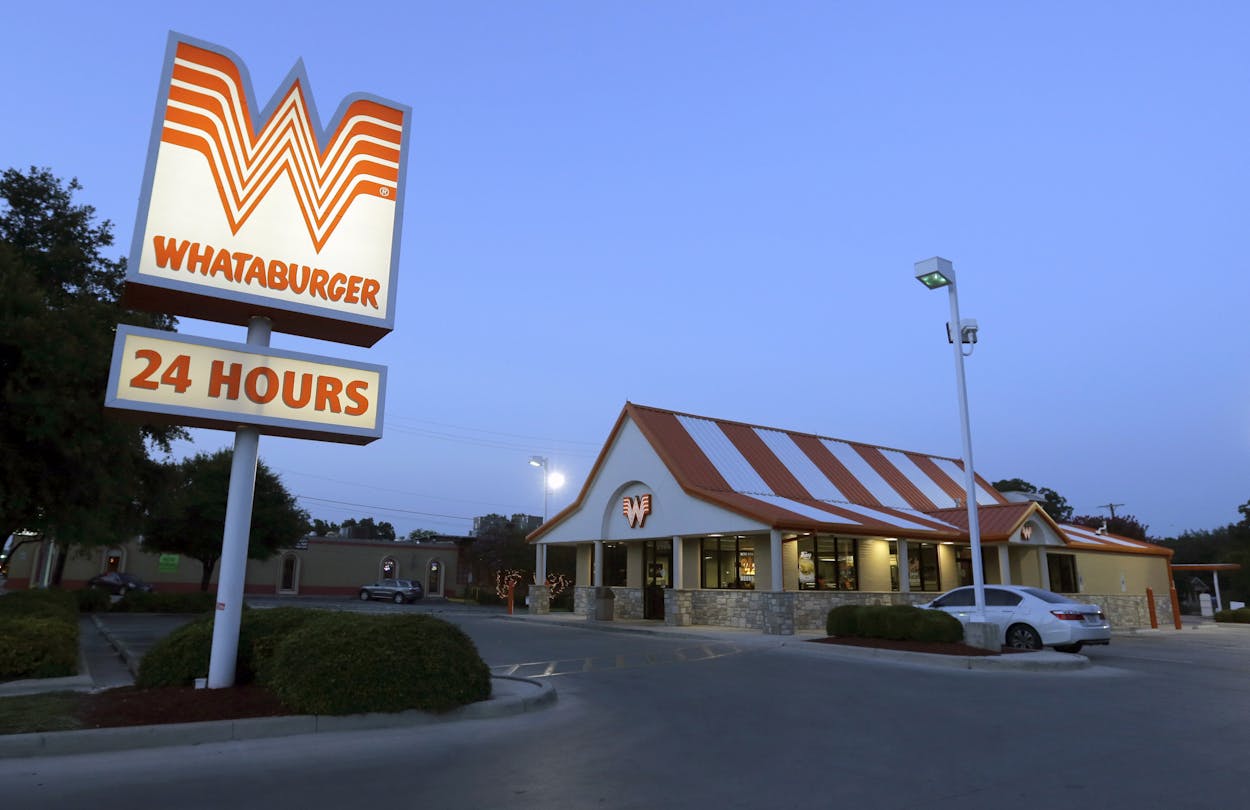If you can’t beat ‘em, eat around ‘em. That may be Whataburger’s strategy in dealing with an uncooperative franchisee in South Texas. Documents filed in a legal case between the iconic Texas burger chain and its oldest franchisee, Whataburger of Alice, claim that Whataburger’s corporate executives are trying to make WOA’s stores obsolete by selling products—like its famous Fancy Ketchup and its own brand of Original Mustard—through HEB and other grocers.
“It’s obvious from these products that Whataburger has begun a plan to sell at retail virtually all of the ingredients that go into its hamburgers, such that customers can have the Whataburger experience back at their own homes without the necessity of coming into restaurants,” WOA says in its court filings.
So far, Whataburger’s retail sales are limited to condiments, pancake mix, and sausage, but WOA argues that if the company can sell those items, “there is nothing that would keep them from selling patties, buns, fries, or any other such products.”
Even more upsetting for WOA: it’s paying for all this, at least indirectly. As a franchisee since 1953, WOA is required to fork over advertising fees to Whataburger’s corporate headquarters in San Antonio. While that helps WOA’s stores (major ad campaigns are a rising tide that lifts all boats), it also “has the effect of allowing Whataburger a `free ride’ on the sale of its products at retail outlets.”
There’s been a longstanding battle playing out between WOA and Whataburger’s corporate headquarters, dating back to at least 1993. I wrote about the slightly convoluted feud last September, but it essentially breaks down to this: in 1990, WOA, which decades earlier had been given exclusive rights to Bexar, Bee, Jim Wells, and Webb counties, decided to sell its San Antonio franchises to an outside buyer, in order to better focus on the South Texas market. The case was resolved three years later, with WOA selling its San Antonio stores back to Whataburger in exchange for retaining exclusive rights to develop new stores in Bee, Jim Wells and Webb counties.
The suit that WOA filed last year claims that Whataburger violated that 22-year-old agreement between the two companies, and that the burger chain is squeezing franchisees with an eye toward taking the chain public, which Whataburger denies. WOA also argues that their exclusive rights in Bee, Jim Wells, and Webb counties extends to retail products, like the ones sold in H-E-B.
In a response to the lawsuit filed in San Antonio, Whataburger argues that the 1993 agreement is no longer valid because Whataburger transferred all its franchise operations to a newly formed subsidiary in 2007. WOA says it was told that the new division was a cosmetic change that wouldn’t affect the 1993 agreement, which, by the way, also bars Whataburger from transferring it to another company.
Last November, a judge in San Antonio ruled that Whataburger was bound to honor the 1993 agreement. In a statement, Whataburger general counsel Michael Gibbs said the partial summary judgment covered “only a few contractual issues” and noted that the company is appealing the judge’s decision.
As for the sale of condiments in WOA’s territory, Gibbs said the ruling won’t change Whataburger’s plans. “The court’s order did not prohibit Whataburger’s sale of retail products in any manner and we proudly continue to sell our retail products without any limitation whatsoever by the court,” he said. “We are confident in our position in the lawsuit and our outlook for a favorable resolution.”
Even so, if you live in South Texas, you might want to stock up on Whataburger’s Spicy Ketchup or Jalapeno Ranch, just in case.







